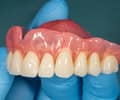What Are Flipper Dentures?
Flipper dentures, also known as acrylic removable partial dentures, are a type of temporary denture that can fill gaps in your smile. These dentures consist of a retainer with one or more prosthetic teeth, and they're usually used to replace missing front teeth.
How Do You Get Flipper Dentures?
If you have lost one or more of your front teeth due to injury or decay, your first step is to see your dental professional for an evaluation. They will determine if a flipper denture is right for you and begin the process of fitting you for one. To create the denture, your dentist will need to take an impression of your mouth. Then, a dental laboratory will then use this impression to make your flipper denture.
How Much Do Flipper Dentures Cost?
The cost of flipper dentures will vary depending on your location and how many prosthetic teeth are needed. According to the Dental Implant Cost Guide, your dental flipper will cost you anywhere from $300 to $500. However, the overall cost depends on the materials your dentist uses and how many teeth you need to replace. Your dental office will be able to let you know how much you can expect to pay. Still, flipper dentures are the least expensive kind of temporary denture available. You may be able to reduce your out-of-pocket costs even further by going to a local dental school for your treatment.
What to Expect When You Start Using Flipper Dentures
When you first get your new flipper denture, it may feel bulky or awkward inside your mouth, but you'll get used to the appliance with time. If you feel pain or pressure in any area due to the dentures, talk to your dental professional. Pain or pressure aren't things that you need to get used to; they indicate that the dentures' fit needs to be adjusted. It's a simple fix that your dental professional will be more than happy to help you remedy.
Because your flipper denture is a retainer, you'll be able to flip it out of position with your tongue. Try to avoid playing with the appliance with your tongue to keep it in place. Flipper dentures are also prone to staining. It's a good idea to avoid highly pigmented foods and drinks like coffee, dark juices, and curries to keep your appliance looking its best.
How Do You Care for Flipper Dentures?
Your flipper dentures need to be cleaned every day to get rid of plaque and food particles. Use a soft-bristle toothbrush to clean the dentures but avoid using toothpaste. Toothpaste can be too harsh for dentures. Instead, the ADA recommends using a mild soap like hand soap or dishwashing liquid. Thoroughly rinse your dentures before you put them back in your mouth to ensure all of the soap is washed away.
What Happens After You Get a Flipper Denture?
Usually, flipper dentures are a temporary solution. And, once the wound left by your missing tooth has healed, a permanent solution like dental implants or a fixed bridge can be used. Flipper dentures can have a loose fit and become uncomfortable over time. Therefore, they're usually not a good long-term option for many patients.
However, there are some cases in which flipper dentures may be a suitable permanent tooth replacement option. Your dentist may recommend long-term denture use if you aren't the right candidate for dental implants or a fixed bridge. If you have financial limitations, a flipper denture may also be the most economical solution for you.
If you're missing one or more of your front teeth, flipper dentures can be an excellent first step to restoring your smile and your confidence. It's never too late to ask your dental professional if flipper dentures are a good option for you.
This article is intended to promote understanding of and knowledge about general oral health topics. It is not intended to be a substitute for professional advice, diagnosis or treatment. Always seek the advice of your dentist or other qualified healthcare provider with any questions you may have regarding a medical condition or treatment.
ORAL HEALTH QUIZ
What's behind your smile?
Take our Oral Health assessment to get the most from your oral care routine
ORAL HEALTH QUIZ
What's behind your smile?
Take our Oral Health assessment to get the most from your oral care routine
Join Us
Get the best of your oral health routine and take it to the next level with expert advice, recommendations, products and solutions and special offers.
Join Us
Get the best of your oral health routine and take it to the next level with expert advice, recommendations, products and solutions and special offers.















